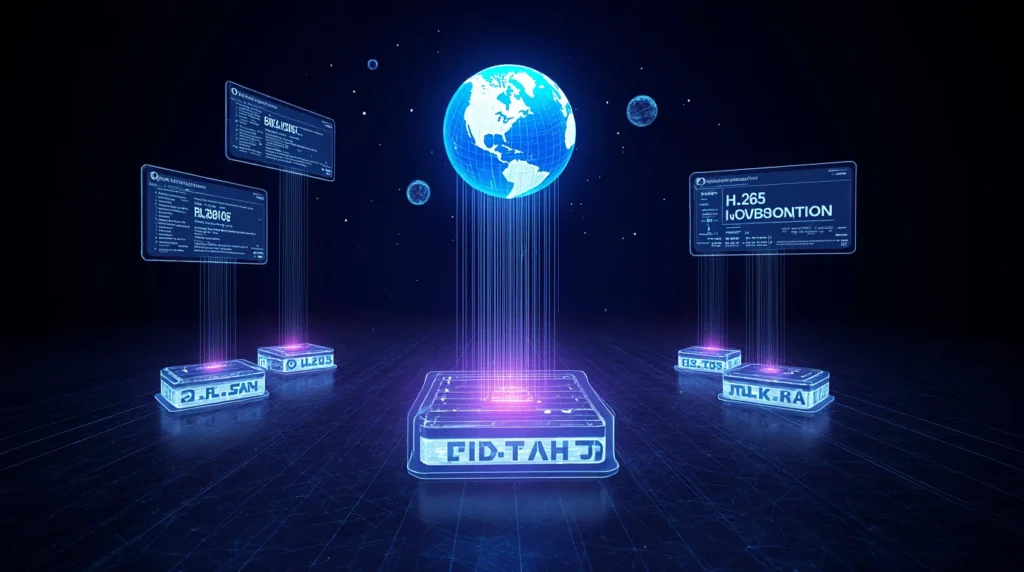
iptv encoder encoders are transforming how we experience digital streaming in unprecedented ways. Imagine accessing over 18,000 TV channels and 40,000 movies and series with zero lag and HD quality guaranteed. This isn’t a distant future scenario—it’s happening right now.
As we look toward 2025, the landscape of streaming technology continues to evolve rapidly. The latest 4K iptv encoder encoders deliver stunning visual clarity, while HDMI iptv encoder encoders provide plug-and-play simplicity for less technical users. Meanwhile, the battle between H.264 iptv encoder encoders and their more efficient H.265 counterparts continues, with HEVC iptv encoder encoders gaining prominence for their superior compression capabilities. Remarkably, premium viewing quality is now available in multiple resolutions including 4K, 2K, FHD, HD, and SD.
In this comprehensive guide, we’ll explore everything you need to know about choosing the right IPTV encoder for your streaming needs. From connectivity options that work with various internet connections like 3G, 4G, ADSL, or Fiber, to understanding why 2025 represents a significant milestone in encoder technology development, we’ve got you covered.
What is an IPTV Encoder and Why It Matters in 2025
Behind every smooth streaming experience lies an unsung hero—the IPTV encoder. These powerful devices form the backbone of today’s digital content delivery systems, yet many viewers remain unaware of their critical role.
Definition and core function
An IPTV encoder is a specialized device or software that transforms raw video content into streamable digital formats for distribution over internet protocol networks. This essential technology takes content from video sources—whether live camera feeds or uncompressed files from digital storage—and converts it into formats compatible with web browsers, smartphones, and other viewing devices. The encoding process involves two primary functions: format conversion and compression.
During compression, the encoder reduces file sizes dramatically while maintaining acceptable quality levels, which significantly decreases hardware strain and improves transfer speed. For context, effective video compression can reduce file sizes by up to 99% while preserving broadcast-quality visuals. This mathematical marvel analyzes video frames pixel by pixel, identifying redundant information and patterns that can be represented more efficiently.
How IPTV encoders fit into the streaming ecosystem
IPTV encoders operate as crucial links in the content delivery chain. The process begins when these devices capture video signals from sources like cameras or media servers. After encoding and compression, the content is stored on web servers from which viewers can access it. For the final step, IPTV decoders receive and convert this content into formats that televisions and other digital devices can display.
The versatility of IPTV encoders supports both unicast and multicast transmission methods. Unicast delivers personalized content to individual users, whereas multicast efficiently distributes identical content to multiple viewers simultaneously, optimizing bandwidth usage. This flexibility makes IPTV solutions indispensable across numerous sectors including broadcasting, education, healthcare, entertainment, and security.
Professional IPTV encoders handle multiple input sources simultaneously, processing everything from live camera feeds to satellite broadcasts and pre-recorded content. They maintain precise timing synchronization while applying consistent compression parameters. For businesses dependent on IPTV, high-quality encoders represent a valuable investment that enables effective content streaming and viewing.
Why 2025 is a turning point for encoder technology
The year 2025 marks a significant evolution in encoder technology driven by several converging factors. First, the widespread adoption of 4K and Ultra HD content is necessitating more sophisticated encoding solutions. Modern encoders now incorporate machine learning algorithms that dynamically adapt compression parameters based on content characteristics.
Additionally, the ongoing transition from H.264 to more advanced standards like H.265 (HEVC) is revolutionizing compression efficiency. HEVC encoding offers up to 50% more data compression compared to H.264, enabling the transmission of 4K content with substantially lower bandwidth requirements. This advancement is particularly critical as bandwidth efficiency directly impacts both operational costs and revenue potential.
The growing maturity of software-based encoders represents another pivotal shift. These solutions now match or exceed the quality levels of their hardware counterparts while offering significant performance and cost advantages. Software encoders provide faster-than-real-time encoding capabilities and greater flexibility to add new formats as they emerge.
For IPTV service providers, 2025’s encoder technology improvements translate to enhanced quality control systems that continuously monitor output for artifacts, timing issues, and compliance with broadcasting standards—automatically adjusting parameters when problems are detected.
Key Features to Look for in a 4K iptv encoder encoders
Selecting the right 4K iptv encoder encoders for your streaming needs requires understanding several critical technical specifications. These powerful devices serve as the foundation of high-quality video distribution, but not all encoders deliver equal performance.
Support for 4K and UHD resolutions
First and foremost, confirm that your encoder fully supports true 4K UHD resolution capabilities. Professional 4K iptv encoder encoders should handle resolutions up to 3840×2160 at 60fps through HDMI 2.0 inputs. This specification ensures crystal-clear image quality that showcases every detail with exceptional clarity. Beyond resolution alone, look for devices that support the full 4K signal path, including HDMI 2.0b compatibility for handling the complete data throughput required for premium UHD content.
Some advanced models offer versatile resolution handling. For instance, certain encoders can simultaneously process four different streams from a single HDMI input, each with adjustable frame rates from 1-60 FPS and individual scaling options. This multi-stream capability allows you to create content for various viewing environments without requiring multiple devices.
H.264 vs H.265 vs HEVC encoding
The encoding format dramatically affects both quality and bandwidth requirements. H.265 (also called HEVC) has emerged as the next-generation standard, offering substantially improved compression efficiency. In practical terms, this means H.265 requires approximately 50% less bandwidth than H.264 for equivalent video quality.
Consider these bandwidth requirements for different resolutions:
- 1080p: H.264 needs 6 Mbps vs. H.265 needs only 3 Mbps
- 4K: H.264 demands 32 Mbps vs. H.265 requires just 15 Mbps
Most professional 4K iptv encoder encoders now support both formats, allowing you to select the optimal codec based on your specific distribution needs. HEVC encoding is especially valuable for future-proofing your content delivery system as it supports resolutions up to 8K UHDTV.
Real-time encoding and latency
For live streaming applications, low latency is essential. Modern IPTV encoders achieve remarkably low glass-to-glass delay—as little as 100ms for HD and 170ms for 4K content when paired with compatible media players. Some encoders deliver encoding-specific latency under 50 milliseconds from HDMI input to IP output in UDP mode (excluding player buffering time).
The lowest latency typically occurs with UDP multicast streaming protocols, which can achieve sub-200ms delays. This real-time processing capability is crucial for interactive applications, sports broadcasting, and other time-sensitive content where viewer experience depends on minimal delay.
Multi-device streaming compatibility
Superior 4K iptv encoder encoders support multiple streaming protocols simultaneously. Look for devices that handle RTMP, HLS, UDP, RTSP, HTTP, and other common formats. This protocol versatility ensures your content reaches viewers regardless of their preferred devices or platforms.
The best encoders allow direct streaming to:
- Smart TVs via m3u8 format and native IPTV apps
- IPTV boxes through multicast/unicast protocols
- Mobile devices via HLS (HTTP Live Streaming)
- Computers using standard media players like VLC
Adaptive bitrate streaming
Adaptive bitrate streaming (ABR) represents one of the most valuable features in modern encoders. This technology dynamically adjusts video quality based on viewers’ available bandwidth. Unlike fixed bitrate approaches, ABR constantly monitors connection speed and automatically switches to the appropriate quality level to maintain uninterrupted playback.
The process works by encoding content at multiple quality levels, then automatically selecting the optimal stream based on real-time network conditions. This ensures viewers always receive the highest quality their connection can reliably support without buffering or interruptions. For IPTV service providers, this results in happier viewers and reduced server load across diverse network environments.
Top 4K iptv encoder encoders to Consider in 2025

In today’s competitive streaming landscape, choosing the right 4K iptv encoder encoders can make all the difference between pixelated frustration and crystal-clear viewing. Let’s explore the top options for 2025, each specialized for different implementation scenarios.
1. HDMI iptv encoder encoders – Best for plug-and-play setups
For those seeking simplicity without sacrificing quality, HDMI IPTV encoders offer straightforward implementation. The SIIG HDMI Video Encoder stands out with its support for multiple video coding formats, including H.265 mainstream and H.264 basic through advanced compression. This versatile encoder handles full HD resolutions up to 1080p@60Hz with HDCP 1.4 compatibility and features convenient HDMI loop-out for local monitoring.
What makes these encoders particularly attractive is their user-friendly web browser-based control interface, allowing easy adjustments for encoding, audio, and on-screen display settings without technical expertise. For the best iptv encoder encoders solutions in 2025, visit https://kemoiptvstream.com/
2. H.265 iptv encoder encoders – Best for bandwidth efficiency
H.265 encoders deliver remarkable bandwidth efficiency, requiring approximately half the bitrate of H.264 for equivalent video quality. The URayCoder H.265 HDMI Encoder exemplifies this technology, supporting 4K UHD video input and output on its HDMI ports 1 and 2. This innovative product allows multiple video stream outputs simultaneously from each HDMI port, with each stream capable of using different streaming protocols.
Furthermore, these encoders support various streaming protocols including HTTP, RTSP, RTMP(S), SRT, and HLS(M3U8), offering flexibility to reduce bandwidth consumption or enhance image quality based on specific needs.
3. HEVC iptv encoder encoders – Best for future-proofing
HEVC encoders represent the cutting edge of encoding technology, offering superior compression efficiency. The VeCASTER PRO HD HEVC exemplifies this category with its ability to transform HDMI video into selectable HEVC H.265 & H.264 formats. This professional solution distributes full HD HDMI video directly to unlimited smart devices across LAN, WiFi, and internet connections.
Indeed, HEVC technology enables streaming 4K content at approximately 15 Mbps compared to the 32 Mbps required by AVC/H.264, making it ideal for future bandwidth-intensive applications.
4. H.264 iptv encoder encoders – Best for legacy systems
Despite newer technologies, H.264 encoders remain essential for compatibility with existing infrastructure. The VeCASTER with its built-in 1 gigabit hardware server can serve hundreds of concurrent TVs and players without additional components. It connects directly to existing LAN switches, WiFi, or internet routers to stream HDMI video input with ultra-low latency.
Above all, these encoders balance quality and compatibility, making them perfect for operations requiring reliability with legacy systems.
5. Multi-channel iptv encoder encoders – Best for enterprise use
Enterprise environments demand scalability and flexibility, which multi-channel encoders provide. The VITEC MGES-7000 sets new benchmarks with its ability to handle eight 3G/HD/SD input ports or four 4Kp60 streams simultaneously. This high-density blade offers real-time hardware encoding with advanced features like secondary channel support, integrated resolution, and frame-rate scaling.
Consequently, these encoders are ideal for in-house broadcasting, sports venues, and any installation requiring high-quality, low-latency IPTV distribution across numerous endpoints.
Device Compatibility and Integration Options
The true power of 4K iptv encoder encoders becomes apparent when exploring their extensive device compatibility across today’s diverse viewing ecosystem. These versatile devices create bridges between content sources and virtually any screen.
Smart TVs and set-top boxes
Modern iptv encoder encoders support direct streaming to smart TVs through native IPTV apps using m3u8 format. This plug-and-play functionality allows viewers to change channels via their standard TV remote controls without additional hardware. However, for legacy TVs lacking built-in H.264/IP decoding capabilities, IP set-top boxes (STBs) serve as essential decoders, converting IP streams to HDMI for display. The best encoders, like those from kemoiptvstream.com, ensure compatibility across both scenarios.
Streaming platforms and middleware
Beyond traditional viewing, today’s HEVC iptv encoder encoders integrate seamlessly with mainstream platforms including YouTube, Facebook, Twitch, and Twitter. Advanced models can push up to four video streams simultaneously to different platforms, making them ideal for multi-channel distribution. For enterprise environments, middleware solutions provide centralized management portals that control all aspects of content delivery.
Cloud-based IPTV systems
Enterprise-grade H.265 iptv encoder encoders increasingly support cloud-based IPTV headend platforms that capture and ingest content from diverse sources before redistribution. These systems offer remote administration through browser-based interfaces, allowing administrators to manage live channels, schedule recordings, and monitor performance from anywhere.
Mobile and desktop viewing
The versatility of H.264 iptv encoder encoders extends to mobile viewing through HLS protocols that enable direct playback in device browsers without requiring dedicated apps. For desktop environments, compatibility with standard media players like VLC, Media Player, and Kodi ensures universal access. Most importantly, these integrations maintain low latency across all viewing scenarios.
Pricing and Value: What to Expect in 2025
Understanding the price-to-value equation helps make informed decisions when investing in iptv encoder encoders. The market offers options across diverse price points, each with distinct advantages based on your specific needs.
Entry-level vs professional-grade encoders
The digital encoder market spans from affordable entry-level models to sophisticated professional solutions. Entry-level iptv encoder encoders typically range from USD 500.00 to USD 1000.00, making them ideal for smaller operations and startups. In contrast, professional-grade systems can cost anywhere from USD 5000.00 for basic units to over USD 100,000.00 for high-capacity broadcast-grade systems.
Mid-range encoders offer a balance between features and affordability, whereas high-end units support advanced capabilities like HEVC encoding, multi-channel output, and robust monitoring tools. Find competitive pricing and high-value iptv encoder encoders options at https://kemoiptvstream.com/
Subscription vs one-time purchase
Naturally, pricing models vary across the industry. One-time purchases grant permanent access to specific encoding capabilities, suitable for operations with stable requirements. Alternatively, subscription models offer ongoing access to regularly updated features, typically structured as single-user (USD 4480.00), multi-user (USD 6720.00), or enterprise licenses (USD 8960.00).
Hidden costs to watch out for
Beyond the initial investment, several factors impact total ownership costs. Many installations require rack space, cooling systems, and power distribution that can add 20-30% to basic equipment costs. Moreover, operational expenses often exceed initial investments over the encoder’s useful life. Power consumption ranges from 50-500+ watts, translating to USD 200.00-2000.00 annually in electricity costs.
ROI for IPTV service providers
For service providers, ROI calculations must consider various factors. Revenue generation potential varies dramatically based on application type, audience size, and monetization strategy. Live event streaming can generate substantial income through pay-per-view sales or subscription services. Generally, cloud-based encoding allows organizations to scale capacity dynamically, paying only for resources used during peak demand periods.

Conclusion
iptv encoder encoders undoubtedly represent a transformative force in digital streaming, with 2025 marking a significant evolution in their capabilities. Throughout this guide, we’ve seen how these devices form the backbone of content delivery systems, compressing video files by up to 99% while maintaining broadcast-quality visuals.
The landscape of encoding technology continues to advance rapidly. H.265 and HEVC encoders now deliver remarkable efficiency, requiring approximately half the bandwidth of traditional H.264 formats for equivalent quality. Therefore, selecting the right encoder depends primarily on your specific needs – whether you prioritize plug-and-play simplicity with HDMI encoders, bandwidth efficiency with H.265 models, future-proofing with HEVC technology, or legacy compatibility with H.264 solutions.
Device compatibility stands as another crucial consideration. The best encoders work seamlessly across smart TVs, set-top boxes, streaming platforms, and mobile devices. Additionally, they support multiple streaming protocols simultaneously, ensuring your content reaches viewers regardless of their preferred viewing method.
Price-to-value equations vary significantly across the market. Entry-level encoders starting around $500 serve smaller operations well, while professional-grade systems can reach $100,000 for broadcast-quality implementations. Consequently, understanding both immediate costs and long-term operational expenses remains essential for maximizing return on investment.
As streaming technology continues evolving, IPTV encoders will play an increasingly vital role in content delivery. Explore the full range of IPTV encoders for your streaming needs at https://kemoiptvstream.com/ to find solutions that balance quality, efficiency, and cost-effectiveness for your specific requirements. The right encoder choice today ensures you’ll deliver exceptional viewing experiences tomorrow, regardless of how complex the streaming landscape becomes.
FAQs
Q1. What is an iptv encoder encoders and why is it important? An iptv encoder encoders is a device that converts video content into digital formats for streaming over the internet. It’s crucial because it compresses video files while maintaining quality, enabling efficient content delivery across various devices and platforms.
Q2. How does H.265 encoding differ from H.264? H.265 encoding offers superior compression efficiency compared to H.264. It requires approximately 50% less bandwidth to deliver the same video quality, making it ideal for streaming high-resolution content like 4K video.
Q3. What features should I look for in a 4K IPTV encoder? Key features to consider include support for 4K/UHD resolutions, H.265/HEVC encoding capabilities, low latency for real-time streaming, multi-device compatibility, and adaptive bitrate streaming for optimal viewing experiences across different network conditions.
Q4. Are IPTV encoders compatible with various streaming platforms? Yes, modern IPTV encoders are designed to be compatible with a wide range of streaming platforms. Many support direct streaming to services like YouTube, Facebook, and Twitch, as well as integration with smart TVs, set-top boxes, and mobile devices.
Q5. How much should I expect to spend on an iptv encoder encoders in 2025? The cost of IPTV encoders varies widely based on features and capabilities. Entry-level models may start around $500, while professional-grade systems can cost upwards of $100,000. Mid-range options offering a balance of features and affordability are also available.
